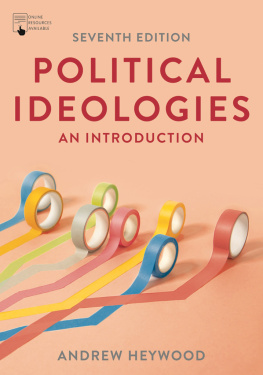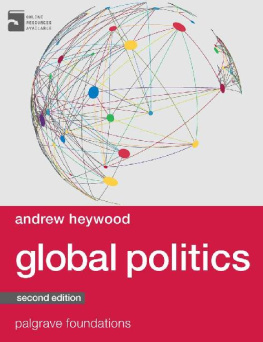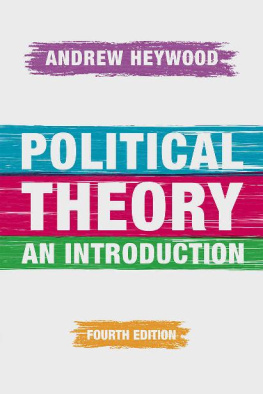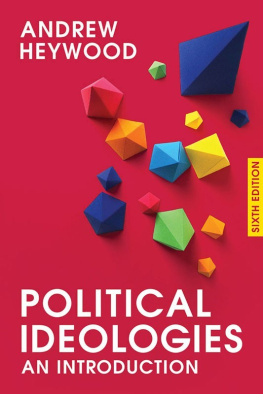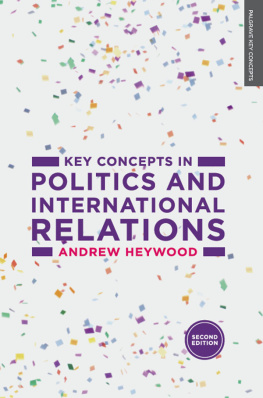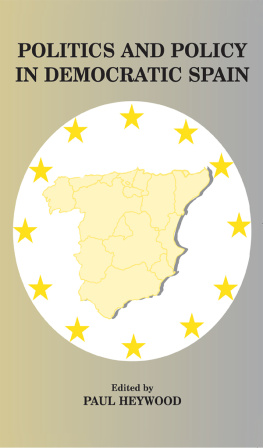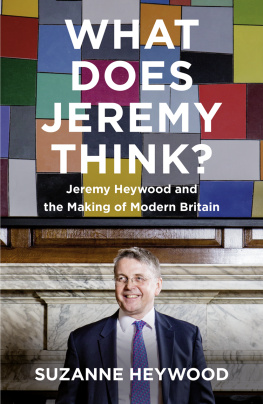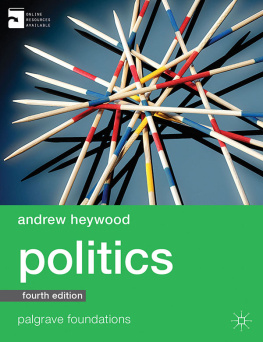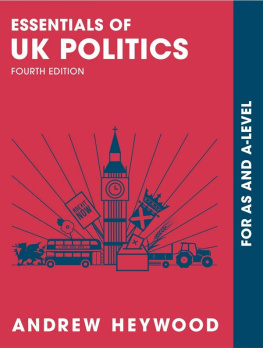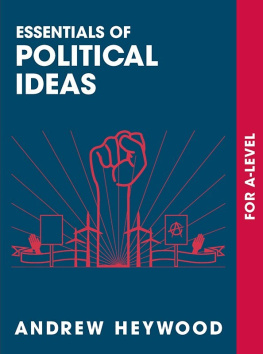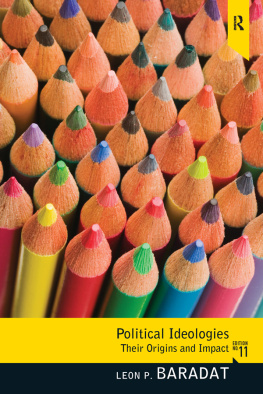Andrew Heywood - Political Ideologies
Here you can read online Andrew Heywood - Political Ideologies full text of the book (entire story) in english for free. Download pdf and epub, get meaning, cover and reviews about this ebook. year: 2022, publisher: Bloomsbury, genre: Politics. Description of the work, (preface) as well as reviews are available. Best literature library LitArk.com created for fans of good reading and offers a wide selection of genres:
Romance novel
Science fiction
Adventure
Detective
Science
History
Home and family
Prose
Art
Politics
Computer
Non-fiction
Religion
Business
Children
Humor
Choose a favorite category and find really read worthwhile books. Enjoy immersion in the world of imagination, feel the emotions of the characters or learn something new for yourself, make an fascinating discovery.
- Book:Political Ideologies
- Author:
- Publisher:Bloomsbury
- Genre:
- Year:2022
- Rating:4 / 5
- Favourites:Add to favourites
- Your mark:
- 80
- 1
- 2
- 3
- 4
- 5
Political Ideologies: summary, description and annotation
We offer to read an annotation, description, summary or preface (depends on what the author of the book "Political Ideologies" wrote himself). If you haven't found the necessary information about the book — write in the comments, we will try to find it.
Political Ideologies — read online for free the complete book (whole text) full work
Below is the text of the book, divided by pages. System saving the place of the last page read, allows you to conveniently read the book "Political Ideologies" online for free, without having to search again every time where you left off. Put a bookmark, and you can go to the page where you finished reading at any time.
Font size:
Interval:
Bookmark:

Every summer I teach a course on politics and popular culture and assign Andrew Heywoods Political Ideologies. The book provides a clear introduction to the isms that shape how most of us think about politics, including, in the new edition, populism. The book hits the sweet spot of being accessible to newcomers and illuminating for more advanced students.
Nicholas Tampio, Fordham University, USA
This brand new edition of Andrew Heywoods Political Ideologies reflects the challenges and developments of our times: it includes a chapter on populism, a feminism chapter comprising intersectionality, trans theory and queer theory, an in-depth analysis of postcolonialism, case studies on contemporary issues and a discussion about the future prospects of each ideology. An indispensable tool for learning and teaching.
Andrea Schapper, University of Stirling, UK
A rare book which helps teachers not only inform but also inspire students to discover their place among competing ideologies. Heywoods orderly presentation provides readers with excellent access to a wide range of ideological identities.
John Uhr, Australian National University, Australia
Political Ideologies represents an excellent resource that continues to be of interest to both staff and students. Heywood sets out and develops a clear understanding of the ideologies that continue to shape contemporary politics and society.
Michael Kyriacou, University of East Anglia, UK
Political Ideologies reflects considerable scholarship but communicates this in a clear and accessible way. The format, including tables and boxes that compare ideologies, is exceptionally reader-friendly. The tracking of the evolution of ideologies is particularly good, and helps students (and others!) make sense of the bewildering forest of labels that litter the political landscape today. This is a book that students will actually read!
Jennifer Leigh Bailey, Norwegian University of Science and Technology, Norway
Andrew Heywoods book remains one of the best introductions to the study of political ideologies. Its main strength lies in the authors ability to explain complex ideas in an engaging and accessible way, while the Political Ideologies in Action features encourage the reader to reflect on the relationship between political ideas and contemporary issues.
Judi Atkins, Aston University, UK
This book is essential reading as a core text in political ideologies. It explores in detail the origins, key concepts, variants and tensions within ideologies, and this new edition provides even more extensive consideration of the most recent developments in ideology such as populism and trans and queer theory. A key attractive feature is the way the book relates ideology to current themes such as decolonising the curriculum, nationalism and the pandemic, anarchism and cyberspace. In short, this is a well-written, comprehensive, up-to-date and above all stimulating text.
Paul Flenley, University of Portsmouth, UK
I teach an introductory course with many general education students. Consequently, I was looking for a text that was above all highly accessible and engaging without sacrificing content. Political Ideologies meets both goals by succinctly outlining foundational material and building meaningful points of comparison across the traditions with ample opportunity to address finer nuances and draw connections to recent events.
Peter Doerschler, Bloomsburg University of Pennsylvania, USA

BRIEF CONTENTS
CONTENTS
KEY FIGURES
KEY CONCEPTS
PERSPECTIVES ON...
TENSIONS WITHIN...
POLITICAL IDEOLOGIES IN ACTION
This book contains a number of pedagogical features to help you understand each ideology discussed, the key thinkers and concepts associated with them, the differences between them and the tensions within them.
At the start of each chapter...

Chapter previews highlight the broad nature of the ideology and give a taste of the discussion to follow in the chapter.
Within each chapter
Definitions of key terms, highlighted in the text, appear on the page where they are used, instead of in a separate glossary.
Environmentalism: A concern about the natural environment and particularly about reducing environmental degradation: a policy orientation rather than an ideological stance.
Humanism: A philosophy that gives moral priority to the achievement of human needs and ends.
Key figure boxes offer biographical details about the major thinkers and their influence on each ideological tradition, as well as highlighting their key writings.

KEY CONCEPT
PRAGMATISM
Pragmatism, broadly defined, refers to behaviour that is shaped in accordance with practical circumstances and goals, rather than principles or ideological objectives. As a philosophical tradition, associated with classical pragmatists such as William disputes that seeks to clarify the mean and hypotheses by identifying consequences. The benefits of pragm are that it allows policies and politic be judged on their merits (on the works), and that it prevents ideology divorced from reality and turning in thinking. Critics, however, equate p
Key concept boxes provide extended explanations of important ideas that underpin the ideologies under discussion.
Perspectives on... features consider rival perspectives on important political themes.
PERSPECTIVES ON...IDEOLOGY
LIBERALS, sanctioned belief system that claims a monopoly of truth, often through a spurious claim to be scientific. Ideology is therefore inherently repressive, even totalitarian; its prime examples are communism and fascism.
CONSERVATIVES have traditionally regarded ideology as a manifestation of the arrogance of rationalism. Ideologies are elaborate systems of thought that are dangerous or unreliable because, being abstracted from reality, they establish principles and goals that lead to repression, or are simply unachievable. In this light, socialism and liberalism are clearly ideological.
SOCIALISTS, following Marx, have seen ideology as a body of ideas that conceal the contradictions of class society, thereby promoting false consciousness and political passivity among subordinate classes. Liberalism is the classic ruling-class ideology. Later Marxists adopted
 | ||
| Neoliberalism | VS | Neoconservatism |
| classical liberalism |
Font size:
Interval:
Bookmark:
Similar books «Political Ideologies»
Look at similar books to Political Ideologies. We have selected literature similar in name and meaning in the hope of providing readers with more options to find new, interesting, not yet read works.
Discussion, reviews of the book Political Ideologies and just readers' own opinions. Leave your comments, write what you think about the work, its meaning or the main characters. Specify what exactly you liked and what you didn't like, and why you think so.

